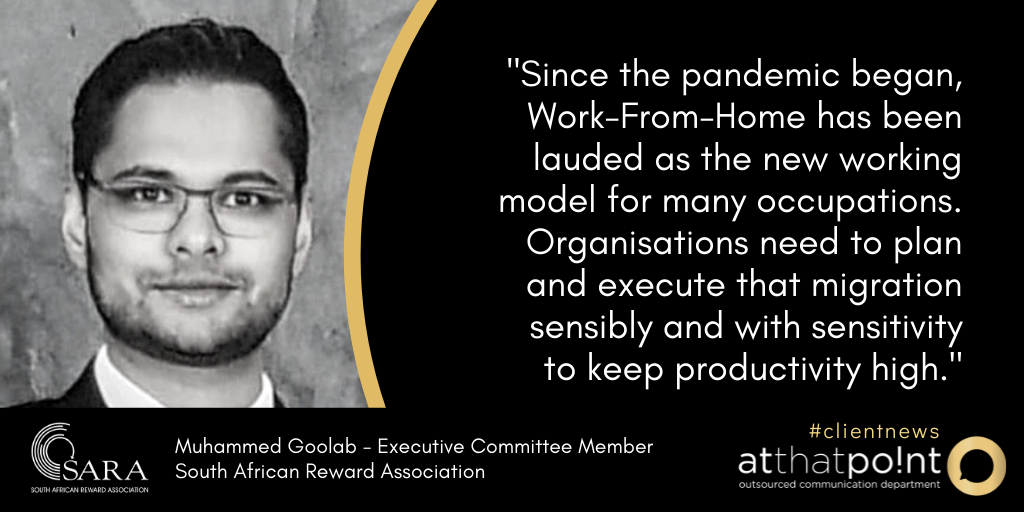|
Since the pandemic began, Work-From-Home (WFH) has been lauded as the new working model for many occupations.
Now, with vaccination efforts ramping up, some employers are eager to get their staff back to the office. “Organisations need to plan and execute that migration sensibly and with sensitivity to keep productivity high,” says Muhammed Goolab, Exco member at the South African Reward Association (SARA). He offers the following advice on key considerations they should be aware of. Unique business needs Unique driving forces may require employees to resume their duties on premises. Certain types of teams are simply more productive working together than remotely. Some management structures and styles are not easily adapted for digital collaboration, or managers perceive a loss of control under a WFH model. It can also be more difficult to onboard new employees or impart essential skills to junior staff at a distance. Remote employees themselves could feel disconnected from the organisation and isolated from their peers. A lack of personal connection can weigh heavily on their mental health, well-being and productivity. “This is especially concerning when the customer experience is impacted by demotivated frontline staff,” says Goolab. Hybrid working models Although circumstances may require a return to work, employers will likely favour a hybrid model. A mix of on-site and WFH employees can increase productivity and offer flexibility that promotes employees’ overall well-being. While remote workers enjoy lower work-related expenses, like travel, employers can also scale back on office space, equipment, canteen and other costs. “Conversely, tensions need to be managed as on-premises workers may perceive their remote counterparts as less productive but receiving better benefits, and therefore unfairly remunerated,” warns Goolab. Culture shock For some employees, long-term WFH has become an entrenched work culture in their daily lives and a sudden return to the workplace could prove disruptive. Others are only too happy to get back to a professional environment free from distractions. “Employers can leverage these contrasting attitudes to map out a planned and gradual return that welcomes affected workers back a few days more each week or month to ease their transition to full-time attendance,” says Goolab. WFH as a reward Before getting all hands back on deck, organisations should review WFH as a benefit that can attract and retain in-demand talent. Employees with sought-after qualifications and skills, and who value greater flexibility, will be drawn to employers that afford them more freedom, trusting them to manage their workload responsibly. “Employers can also attract talent from a much wider and more diverse talent pool than they could if requiring staff to be at the workplace,” says Goolab. ENDS MEDIA CONTACT: Rosa-Mari Le Roux, 060 995 6277, [email protected], www.atthatpoint.co.za For more information on SARA please visit: Website: www.sara.co.za Twitter: @SA_reward LinkedIn: South African Reward Association Facebook: SARA – South African Reward Association
0 Comments
Leave a Reply. |
Archives
March 2023
Welcome to the South African Reward Association newsroom.
Categories
All
|


 RSS Feed
RSS Feed